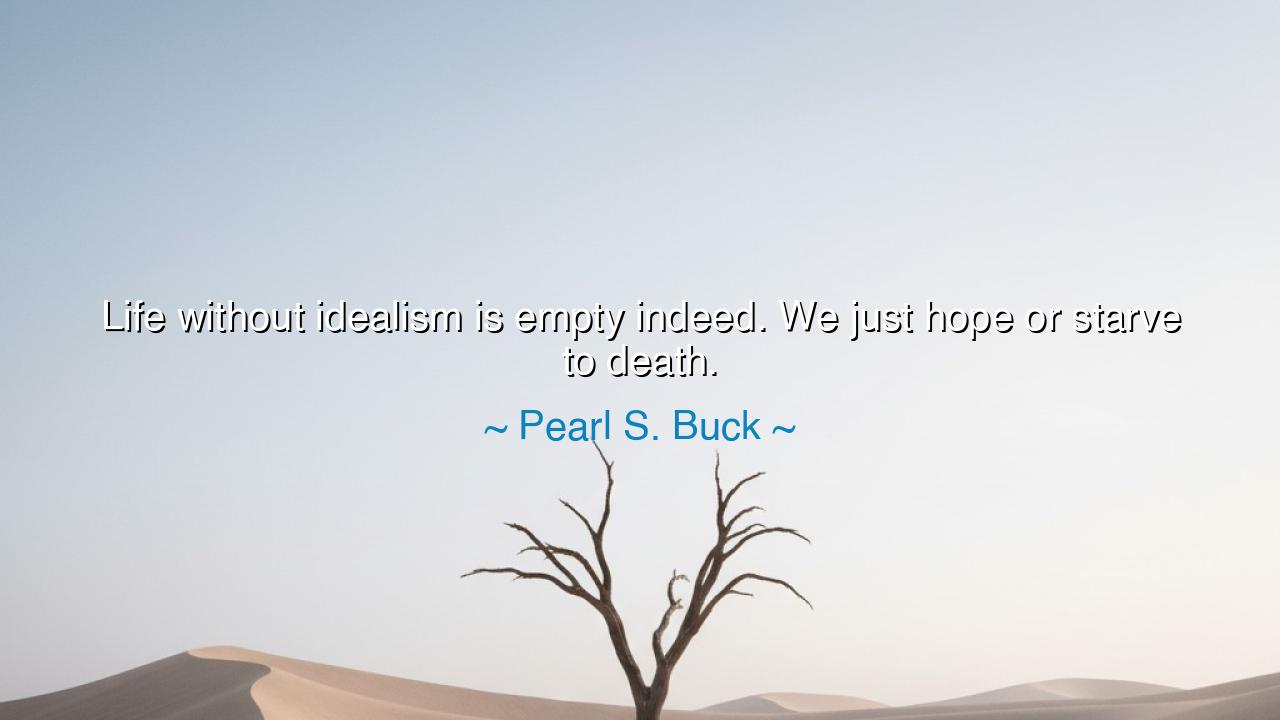
Life without idealism is empty indeed. We just hope or starve to






“Life without idealism is empty indeed. We just hope or starve to death.” Thus spoke Pearl S. Buck, the great chronicler of human struggle and spirit — a woman who walked between worlds, who saw both the poverty of the body and the poverty of the soul. In these words, she captures a truth as old as civilization itself: that idealism, the capacity to dream beyond the present, is the very breath of life. Without it, we do not merely suffer; we starve, not for food, but for meaning. The body may survive on bread, but the soul survives on hope — on the vision of something better, purer, yet to be born.
To understand her words, we must remember the world she knew. Pearl S. Buck lived between the soil of China and the conscience of America, witnessing hunger, oppression, and the slow grinding of human endurance. She saw lives stripped bare by hardship, yet she also saw how men and women endured through faith in ideals — in justice, in compassion, in the possibility of a gentler world. It was this faith that turned suffering into purpose. And so she said that to live without idealism is to live hollowly, to exist without the music that animates the soul. To lose one’s ideals is to lose the inner fire that makes existence worth the pain it requires.
Idealism, in its truest form, is not naive dreaming, as the cynics claim. It is the power to imagine what is not yet real — and to labor, with hands and heart, toward its creation. Every great age of humanity has been shaped by such dreamers. The ancient prophets who envisioned peace in a time of war; the reformers who defied kings to proclaim equality; the inventors who refused to accept the limits of their age — all were sustained by ideals. The realist may endure, but the idealist transforms. Without them, humanity would never have risen from the dust; we would have accepted the chains of circumstance and called them fate.
Consider the life of Mahatma Gandhi, who faced an empire with nothing but the idea of nonviolence. His body was frail, his tools were words and fasting, yet his ideal was immense — that freedom could be won not through hatred, but through love. For this belief, he was imprisoned, beaten, and mocked. But it was his ideal, not his strength, that conquered. When his followers marched barefoot to the sea in the Salt March, they carried not weapons but faith — faith that the moral force of truth would outlast any empire. Gandhi’s life, like Buck’s words, reminds us that those who cling to their ideals may suffer, but those who abandon them are already dead within.
Yet, Pearl S. Buck speaks not only of nations and revolutions, but of the individual soul. For even in the quiet life — in the laborer, the artist, the teacher — idealism is the compass that gives direction. To rise each day and strive toward something better, to seek kindness in a cruel world, to create beauty amid despair — this too is idealism. The one who loses it becomes empty, a vessel without purpose. The ancients would have called such a person spiritually starved — a being who breathes but does not live. Hope, then, is not luxury; it is necessity, as vital as air.
But idealism must not remain a whisper in the mind; it must be translated into action. The one who only dreams but does not labor is like a farmer who tills the air and expects a harvest. Buck’s warning is twofold: hope without action is hunger unfulfilled, but action without idealism is toil without meaning. The two must be wedded — the dreamer’s heart and the doer’s hand. Together they make life not merely bearable, but luminous. For when we work in service of an ideal — however small — our labor becomes sacred, and our days are filled with purpose.
So, my child, take these words as nourishment for your journey. Guard your ideals as you would your very breath, for they will guide you when the world grows cold. Let cynicism not consume you; let despair not silence your dreams. Feed your idealism with courage and action. Work toward something greater than yourself — even if you fail, you will have lived fully, not merely survived.
For as Pearl S. Buck teaches, it is not comfort that keeps the soul alive, but hope — and not the passive hope that waits for salvation, but the fierce, enduring hope that dares to build it. A man may live without riches, but not without a reason. A woman may walk through sorrow, but not without a vision. The day we cease to dream of better things is the day we truly starve — for in the end, it is idealism that feeds the heart, sustains the world, and makes life, however fragile, infinitely worth living.






AAdministratorAdministrator
Welcome, honored guests. Please leave a comment, we will respond soon